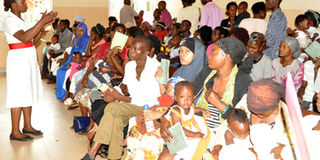Prime
Public warned on juice as typhoid spreads

Nurse Viola Baluku talks to a cross-section of typhoid patients awaiting treatment at Kisenyi Health Centre IV yesterday. The in-charge nurse, Ms Rose Acan, said the number of typhoid patients reported at the facility had shot up to more than 400 in the last two days. PHOTO BY RACHEL MABALA
What you need to know:
Not safe. Health ministry officials say samples of beverages and foods taken from around Kampala contain bacteria that causes typhoid.
KAMPALA. With the number of typhoid cases rising as a result of public consumption of suspected adulterated beverages and foods, Health ministry officials have cautioned the public to be careful as they go shopping on the streets of Kampala.
By yesterday, 513 persons were confirmed admitted after being diagnosed with typhoid. “Kisenyi Health Centre IV which is the designated treatment centre has so far treated 403 of the 513 cases,” a statement issued last evening by the Ministry of Health said.
Dr Monica Musenero, the assistant commissioner in-charge of epidemiology and epidemic diseases at the Health ministry, said preliminary laboratory investigations of sampled beverages and foods contained salmonella – the bacteria that causes typhoid.
Most of these samples of beverages and foods, she said, were picked from the Kampala central business district. “We took samples of water, juices and foods from areas where the outbreak hit hard. We suspect the outbreak is caused by something in the category of juice or water that is widely consumed by people,” said Dr Musenero.
“The first laboratory samples tests and epidemiological links have hinted on water, but it’s still too early to mention which type of water,” she said.
Dr Willington Amutuheire, the supervisor epidemiological and epidemic disease control at Kampala Capital City Authority, warned that after all the investigations the culprits will pay for their mischief.
The Ministry of Health and KCCA have advised the public to avoid eating cold foods, vegetables, and fruits and only drink safe water from reliable sources. The public has further been advised to wash hands with soap and water as frequently as possible.
Meanwhile, Mr Ben Manyindo, the Uganda National Bureau of Standards executive director, cautioned that some makers of juice pack coloured water and claim it’s natural juice. He also estimated that 60 per cent of beverage manufacturers are not compliant to manufacturing standards.
At Kisenyi Health Centre IV, Ms Mbabazi Adellah, one of the patients, said: “We are very many patients, but the health workers treating us are very few.”
Ms Mbabazi, who works at Owino (St Balikuddembe) Market but lives in Makindye, said she had arrived at 7am to seek treatment but by midday she had not been seen by the doctor.
“I appeal to the Ministry of Health to increase on the number of doctors because patients are suffering,” she added.
However, Sister Rose Acan, the senior nursing officer at the health facility, said the numbers are not overwhelming and patients are responding well to treatment. Currently, the medical team at the facility is composed of six doctors, three nurses and three laboratory technicians.
“We are handling and treating them as out-patients and the increase in number is attributed to the awareness about the disease. Those who are already on treatment are responding very well, unlike on the first day when they could barely walk,” Sister Acan said. She advised the patients to adhere to the drugs because failure to do so will worsen the disease.
Mr Mustafa Mayambala, the chairperson of the Association of Taxi Drivers and Conductors, said: “I appeal to KCCA and ministry of Health to extend typhoid treatment to all the five divisions of Kampala as opposed to one treatment centre where doctors are overwhelmed.”
The cases
Most of the cases have been identified among people working around Nakasero Market, Disabled’s Market, New Taxi Park, Allen Road, Nabukeera Plaza, Qualicel, Owino Market and Total petrol station on Namirembe Road. The outbreak was confirmed in Kampala and some parts of Mukono and Wakiso districts last week.
Symptoms include fever and abdominal pain, cough, joint pains, general malaise and dizziness.



